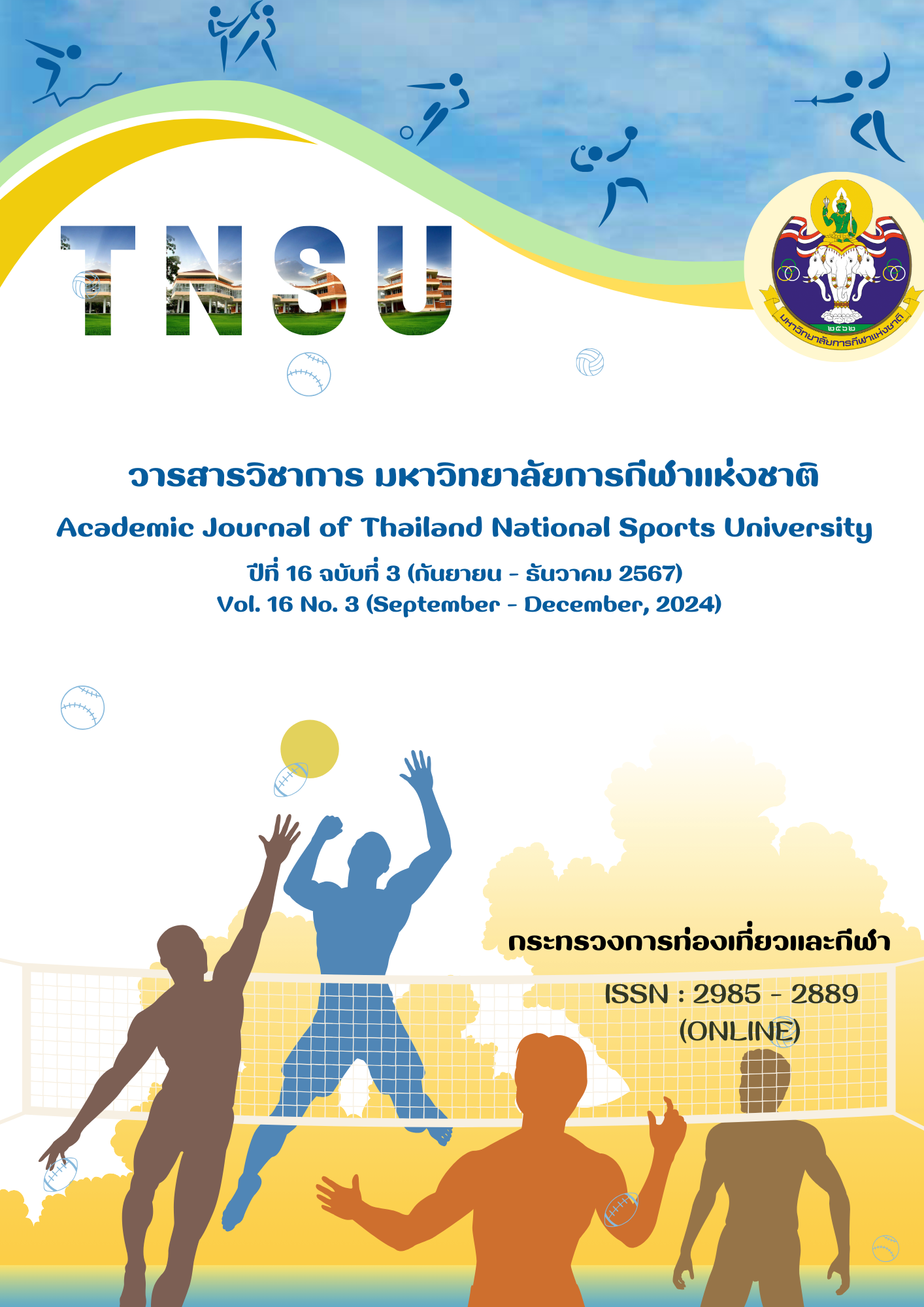THE DEVELOPMENT OF PHYSICAL EDUCATION INSTRUCTIONAL MODEL USING CONTEMPLATIVE EDUCATION WITH CIRCUIT TRAINING TO ENHANCE HOLISTIC WELL - BEING OF HIGH SCHOOL STUDENTS
Main Article Content
Abstract
This research aim was to present physical education instructional model using contemplative education and circuit training to enhance holistic well-being of high school student. The research process was divided in to 5 steps: Step 1) to study the theoretical concepts used from documents, textbooks, and research related to enhance holistic well-being; 2) to analyze and determine components of the contemplative education and circuit training; 3) to analyze the essence of concept, theories and researches related to physical education instructional model; 4) to synthesize the essence components of physical educational model; and 5) to examine the quality of the physical education instructional model which was established including a) the suitability of the instructional model by using an evaluation from, and b) the consistency of instructional model by using a 5 – level estimator questionnaire.
The results of the research showed that instructional model consists of the following components: 1) principles of instructional model, 2) Objectives of instructional model, 3) Step of instructional model and 4) Evaluation of instruction model. The result of the qualifying examination on the suitability of the training course was a total mean of 4.5, meaning that it was very appropriate, and the consistency index of the instructional model between 0.7 to 0.95 It can be concluded that the proposed learning management model can be used to develop the overall well-being of senior high school students.
Article Details

This work is licensed under a Creative Commons Attribution-NonCommercial-NoDerivatives 4.0 International License.
The published article is a copyright of the Academic Journal of Thailand National Sports University. The passage appeared in each article in this academic journal is a perspective of each author which is not related to the journal. Each author is required to be responsible for all components of his/her own article. If there are any mistakes, each author must be responsible for those mistakes on his/her own.
References
Atthaphon Panchapetkaew. (2017). The effect of learning management based on the cognitive concept of psychology for teachers on academic achievement and readiness for learning through self-directed students with different academic achievements (Master’s thesis), Prince of Songkla University.
Chayanan Saisaksit. (2019). The effect of physical education learning management by station training on the skills of basic movements of elementary school students (Master’s thesis), Chulalongkorn University.
Chitraporn Wongkhamchan, & Kanyawadee Saenngam. (2020). Developing emotional intelligence and learning behaviors of teachers professional students by organizing active learning activities combining concepts, conscience, education. Journal of Roi Et Rajabhat University, 15(1).
Eggen, P., & Kauchak, D. (2012). Strategidan model pembelajarn mengajarkan kontendan keterampilan berpikir. Jakarta: Indeks.
Komol Phoyen. (2021). Active learning: Learning satisfy Education in 21th century. Retrieved from https://so02.tcithaijo.org/index.php/suedujournal/article/view/245317/168931
Natthaphon Pansakul. (2021). Comparative study of health proficiency in the volunteer group Village Public Health and the general public in Phayao Province. Chulalongkorn University.
Sirithon Yimprasert. (2020). The development of a teaching model based on the concept of contemplative education to promote mental public research of grade 4 students. Research report. Bangkok: Bansomdej Chaopraya Rajabhat University.
Thavorn Kamutsri. (2017). Performance enhancement. Bangkok: Media Press.
Thai Health Promotion Foundation. (2021). Promoting and assessing health literacy and health behaviors among children and youth aged 7 – 14 and people aged 15. Nonthaburi: New Normal Printing.
Thai Health Promotion Foundation. (2021). Promoting and Assessing Health Literacy and Health Behaviors among Children and Youth aged 7-14 and People aged 15, Revised 2020. Nonthaburi: New Normal Printing.
Thida Mekwatat, Saowaluck Sankeiad, & Suwimon Thanomchit. (2018). The development of learning potential in koh islander School model creates happiness for students and families using the process “mindfulness education” koh kood wittayakhom school. Office of the basic education commission ministry of education.
Wijarn Panich. (2014). How learning takes place. Bangkok: Siam Commercial Foundation.
Worasak Pianchob. (2017). A collection of articles, about philosophy, principles, teaching methods, and measurements for evaluation. Physical education. Publishing House of Chulalongkorn University.


